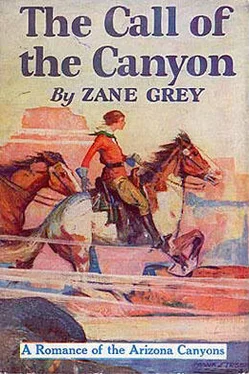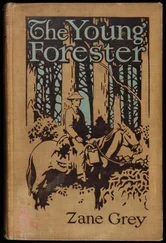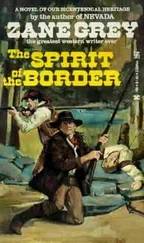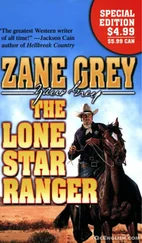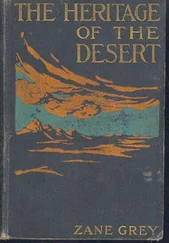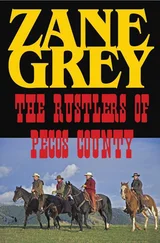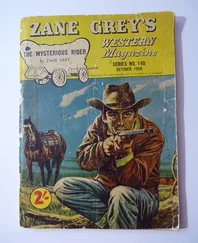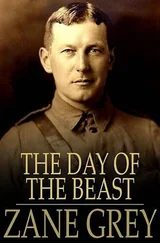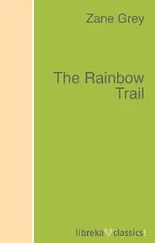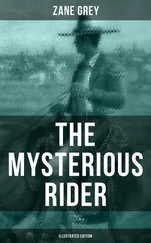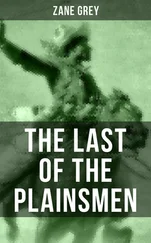Zane Grey - The Call of the Canyon
Здесь есть возможность читать онлайн «Zane Grey - The Call of the Canyon» весь текст электронной книги совершенно бесплатно (целиком полную версию без сокращений). В некоторых случаях можно слушать аудио, скачать через торрент в формате fb2 и присутствует краткое содержание. Жанр: Старинная литература, на английском языке. Описание произведения, (предисловие) а так же отзывы посетителей доступны на портале библиотеки ЛибКат.
- Название:The Call of the Canyon
- Автор:
- Жанр:
- Год:неизвестен
- ISBN:нет данных
- Рейтинг книги:5 / 5. Голосов: 1
-
Избранное:Добавить в избранное
- Отзывы:
-
Ваша оценка:
- 100
- 1
- 2
- 3
- 4
- 5
The Call of the Canyon: краткое содержание, описание и аннотация
Предлагаем к чтению аннотацию, описание, краткое содержание или предисловие (зависит от того, что написал сам автор книги «The Call of the Canyon»). Если вы не нашли необходимую информацию о книге — напишите в комментариях, мы постараемся отыскать её.
The Call of the Canyon — читать онлайн бесплатно полную книгу (весь текст) целиком
Ниже представлен текст книги, разбитый по страницам. Система сохранения места последней прочитанной страницы, позволяет с удобством читать онлайн бесплатно книгу «The Call of the Canyon», без необходимости каждый раз заново искать на чём Вы остановились. Поставьте закладку, и сможете в любой момент перейти на страницу, на которой закончили чтение.
Интервал:
Закладка:
Carley went out to the workmen. The house should be completed and she would live in it. Always there was the stretching and illimitable desert to look at, and the grand heave upward of the mountains. Hoyle was full of zest for the practical details of the building. He saw nothing of the havoc wrought in her. Nor did the other workmen glance more than casually at her. In this Carley lost something of a shirking fear that her loss and grief were patent to all eyes.
That afternoon she mounted the most spirited of the mustangs she had purchased from the Indians. To govern him and stick on him required all her energy. And she rode him hard and far, out across the desert, across mile after mile of cedar forest, clear to the foothills. She rested there, absorbed in gazing desertward, and upon turning back again, she ran him over the level stretches. Wind and branch threshed her seemingly to ribbons. Violence seemed good for her. A fall had no fear for her now. She reached camp at dusk, hot as fire, breathless and strengthless. But she had earned something. Such action required constant use of muscle and mind. If need be she could drive both to the very furthermost limit. She could ride and ride–until the future, like the immensity of the desert there, might swallow her. She changed her clothes and rested a while. The call to supper found her hungry. In this fact she discovered mockery of her grief. Love was not the food of life. Exhausted nature's need of rest and sleep was no respecter of a woman's emotion.
Next day Carley rode northward, wildly and fearlessly, as if this conscious activity was the initiative of an endless number of rides that were to save her. As before the foothills called her, and she went on until she came to a very high one.
Carley dismounted from her panting horse, answering the familiar impulse to attain heights by her own effort.
"Am I only a weakling?" she asked herself. "Only a creature mined by the fever of the soul! ... Thrown from one emotion to another? Never the same. Yearning, suffering, sacrificing, hoping, and changing–forever the same! What is it that drives me? A great city with all its attractions has failed to help me realize my life. So have friends failed. So has the world. What can solitude and grandeur do? ... All this obsession of mine–all this strange feeling for simple elemental earthly things likewise will fail me. Yet I am driven. They would call me a mad woman."
It took Carley a full hour of slow body-bending labor to climb to the summit of that hill. High, steep, and rugged, it resisted ascension. But at last she surmounted it and sat alone on the heights, with naked eyes, and an unconscious prayer on her lips.
What was it that had happened? Could there be here a different answer from that which always mocked her?
She had been a girl, not accountable for loss of mother, for choice of home and education. She had belonged to a class. She had grown to womanhood in it. She had loved, and in loving had escaped the evil of her day, if not its taint. She had lived only for herself. Conscience had awakened–but, alas! too late. She had overthrown the sordid, self-seeking habit of life; she had awakened to real womanhood; she had fought the insidious spell of modernity and she had defeated it; she had learned the thrill of taking root in new soil, the pain and joy of labor, the bliss of solitude, the promise of home and love and motherhood. But she had gathered all these marvelous things to her soul too late for happiness.
"Now it is answered," she declared aloud. "That is what has happened? ... And all that is past... . Is there anything left? If so what?"
She flung her query out to the winds of the desert. But the desert seemed too gray, too vast, too remote, too aloof, too measureless. It was not concerned with her little life. Then she turned to the mountain kingdom. It seemed overpoweringly near at hand. It loomed above her to pierce the fleecy clouds. It was only a stupendous upheaval of earth-crust, grown over at the base by leagues and leagues of pine forest, belted along the middle by vast slanting zigzag slopes of aspen, rent and riven toward the heights into canyon and gorge, bared above to cliffs and corners of craggy rock, whitened at the sky-piercing peaks by snow. Its beauty and sublimity were lost upon Carley now; she was concerned with its travail, its age, its endurance, its strength. And she studied it with magnified sight.
What incomprehensible subterranean force had swelled those immense slopes and lifted the huge bulk aloft to the clouds? Cataclysm of nature–the expanding or shrinking of the earth-vast volcanic action under the surface! Whatever it had been, it had left its expression of the travail of the universe. This mountain mass had been hot gas when flung from the parent sun, and now it was solid granite. What had it endured in the making? What indeed had been its dimensions before the millions of years of its struggle?
Eruption, earthquake, avalanche, the attrition of glacier, the erosion of water, the cracking of frost, the weathering of rain and wind and snow– these it had eternally fought and resisted in vain, yet still it stood magnificent, frowning, battle-scarred and undefeated. Its sky-piercing peaks were as cries for mercy to the Infinite. This old mountain realized its doom. It had to go, perhaps to make room for a newer and better kingdom. But it endured because of the spirit of nature. The great notched circular line of rock below and between the peaks, in the body of the mountains, showed where in ages past the heart of living granite had blown out, to let loose on all the near surrounding desert the streams of black lava and the hills of black cinders. Despite its fringe of green it was hoary with age. Every looming gray-faced wall, massive and sublime, seemed a monument of its mastery over time. Every deep-cut canyon, showing the skeleton ribs, the caverns and caves, its avalanche-carved slides, its long, fan-shaped, spreading taluses, carried conviction to the spectator that it was but a frail bit of rock, that its life was little and brief, that upon it had been laid the merciless curse of nature. Change! Change must unknit the very knots of the center of the earth. So its strength lay in the sublimity of its defiance. It meant to endure to the last rolling grain of sand. It was a dead mountain of rock, without spirit, yet it taught a grand lesson to the seeing eye.
Life was only a part, perhaps an infinitely small part of nature's plan. Death and decay were just as important to her inscrutable design. The universe had not been created for life, ease, pleasure, and happiness of a man creature developed from lower organisms. If nature's secret was the developing of a spirit through all time, Carley divined that she had it within her. So the present meant little.
"I have no right to be unhappy," concluded Carley. "I had no right to Glenn Kilbourne. I failed him. In that I failed myself. Neither life nor nature failed me–nor love. It is no longer a mystery. Unhappiness is only a change. Happiness itself is only change. So what does it matter? The great thing is to see life–to understand–to feel–to work–to fight–to endure. It is not my fault I am here. But it is my fault if I leave this strange old earth the poorer for my failure... . I will no longer be little. I will find strength. I will endure... . I still have eyes, ears, nose, taste. I can feel the sun, the wind, the nip of frost. Must I slink like a craven because I've lost the love of one man? Must I hate Flo Hutter because she will make Glenn happy? Never! ... All of this seems better so, because through it I am changed. I might have lived on, a selfish clod!"
Carley turned from the mountain kingdom and faced her future with the profound and sad and far-seeing look that had come with her lesson. She knew what to give. Sometime and somewhere there would be recompense. She would hide her wound in the faith that time would heat it. And the ordeal she set herself, to prove her sincerity and strength, was to ride down to Oak Creek Canyon.
Читать дальшеИнтервал:
Закладка:
Похожие книги на «The Call of the Canyon»
Представляем Вашему вниманию похожие книги на «The Call of the Canyon» списком для выбора. Мы отобрали схожую по названию и смыслу литературу в надежде предоставить читателям больше вариантов отыскать новые, интересные, ещё непрочитанные произведения.
Обсуждение, отзывы о книге «The Call of the Canyon» и просто собственные мнения читателей. Оставьте ваши комментарии, напишите, что Вы думаете о произведении, его смысле или главных героях. Укажите что конкретно понравилось, а что нет, и почему Вы так считаете.
